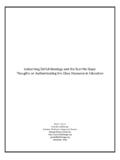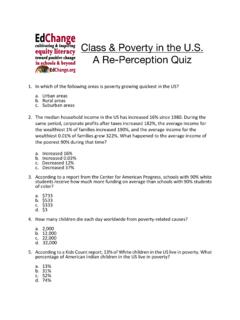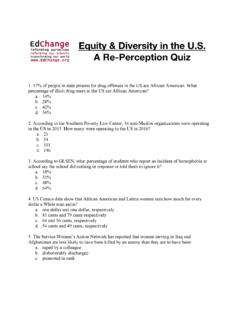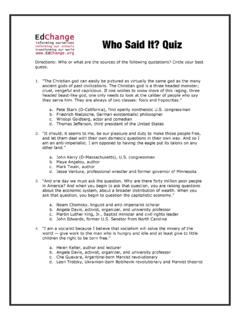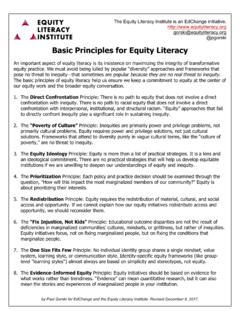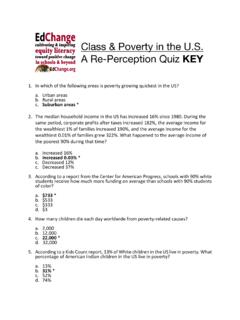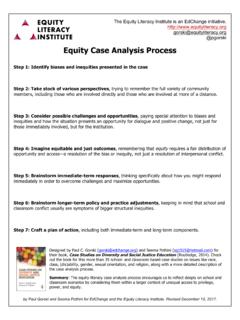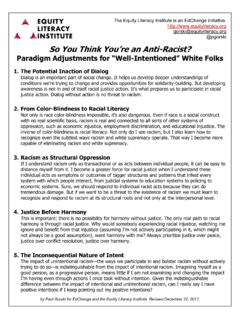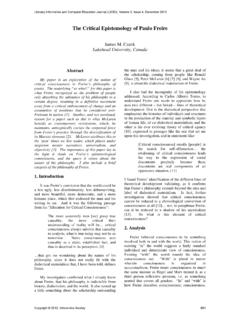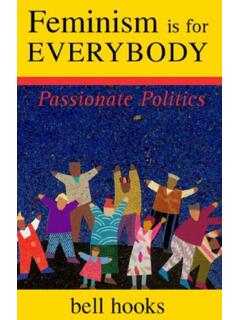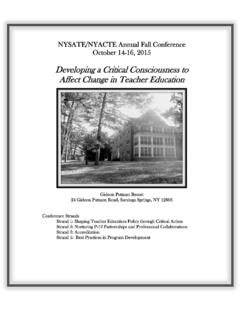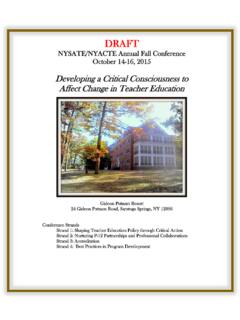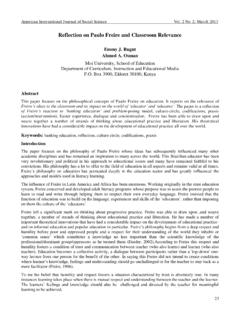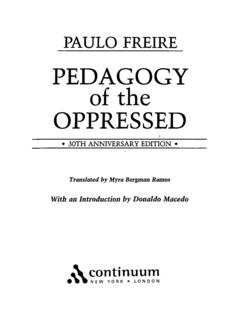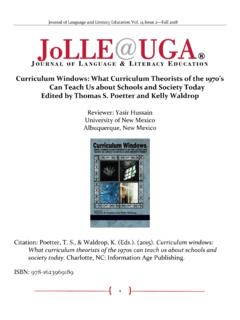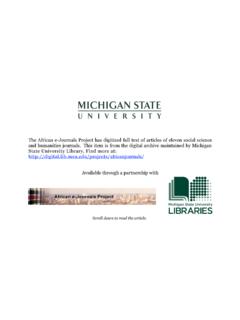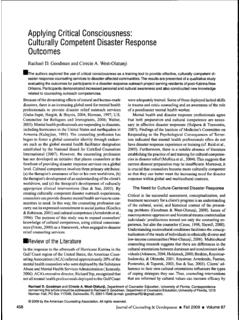Transcription of Teaching and Teacher Education - EdChange
1 What we re Teaching teachers: An analysis of multicultural teachereducation coursework syllabiPaul C. Gorski*George Mason University, 4400 University Avenue, MS 5D3, Fairfax, Virginia 22030, USAarticle infoArticle history:Received 2 June 2008 Received in revised form27 June 2008 Accepted 15 July 2008 Keywords: Teacher educationMulticultural educationDiversityMulticulturalismabstra ctThis study is an examination of syllabi from multicultural Teacher Education (MTE) courses taught acrossthe United States. Using qualitative content analysis and drawing on existing typologies for multiculturaleducation, I analyzed the theories and philosophies underlying MTE course designs. The analysisrevealed that most of the courses were designed to prepare teachers with pragmatic skills and personalawareness, but not to prepare them in accordance with the key principles of multicultural Education ,such as critical consciousness and a commitment to educational equity.
2 An unexpected outcome wasa new five-layer typology for MTE. 2008 Elsevier Ltd. All rights IntroductionA broad range of scholars have conducted an equally broad rangeof scholarship on multicultural Teacher Education (MTE) in that explores national and state policy initiatives(Gollnick, 1995), Teacher Education program curricula (Jennings,2008; Ladson-Billings,1995; Zeichner & Hoeft,1996), approaches toMTE (Jenks, Lee, & Kanpol, 2001; McAllister & Irvine, 2000; Moss,2008), the social and political contexts for MTE (Weiner, 2000), thenature of session offerings at national multicultural educationconferences (Amosa & Gorski, in press), and the body of relatedliterature itself (Cochran-Smith, Davis, & Fries, 2004; Sleeter, 2001a,2001b; Trent, Kea, & Oh, 2008).
3 These scholars reach a variety ofconclusions, but on this they generally agree: what passes for MTEin most cases is notmulticulturalat alldat least not when assessedagainst multicultural Education paradigms as conceived byBanks(2004a, 2004b), Grant and Sleeter (2006), Nieto (2004), and othertheorists. Instead, according toCochran-Smith (2004), Gorski(2006), Vavrus (2002), and others, MTE initiatives (including degreeprograms, staff development workshops, or individual multicul-tural Education courses) tend to focus oncelebrating diversityorunderstanding the cultural other dthe first developmental stage ofmulticultural practice (Grant & Sleeter, 2006).Unfortunately, there exists very little empirical research exam-ining how these discrepancies play outin practice.
4 In order to helpfill a portion of this hole, I analyzed syllabi for Teacher educationcourses on multicultural Education and related topicsdthosetaught in Teacher Education programs across the United States. Ifocused specifically on uncovering the ways in which these coursesframe and conceptualize multicultural Education . Are they designedto encourage pre- and in-service teachers to practice multiculturaleducation in a tokenizingcelebrating diversitymanner or do theytranscend such an approach, presenting multicultural educationwith a more critical , social reconstructionist framework, consistentwith the field s foundations of social justice and critical pedagogy?I share here the results of this analysis. I present, as well, anunexpected outcome of this study: a new typology for approachesto MTE couple important caveats: first, as a Teacher educator, I oftenhave diverted from an official course design once the classroomdoor was closed.
5 As Teacher educators, we bring our philosophies,strengths, and limitations into our Teaching . Therefore, I cannotclaim to have discerned what, exactly, occurred in any particularcourse by examining its syllabus. It is reasonable to believe thatsome people Teaching the courses engaged a more critical approachthan outlined in the syllabus while others engaged a less criticalapproach. It is reasonable to believe, as well, that some professorsor instructors consciously used depoliticized language in coursedescriptions, despite their intention to engage deeply politicizedframes once their students were before them. (I have done so.) This,then, is not a study of individual instructor practice or philsophy, oftheexplicit curriculumof MTE. Rather, it is a study of the philoso-phies that underlie theofficial curriculumof MTEdwhat institu-tions that prepare teachers codify within syllabi as their approachesto MTE.
6 *Tel.: 1 651 503 lists available atScienceDirectTeaching and Teacher Educationjournal homepage: $ see front matter 2008 Elsevier Ltd. All rights and Teacher Education 25 (2009) 309 318 Second, in order to control for certain variables, such as theinfluence of national standards and accreditation agencies expec-tations for Teacher competencies, I constrained my data set tosyllabi for courses taught within the I believe, however, that theresults and discussion herein are relevant across national borders. Itis my hope that they will inform a larger cross-border discourseabout the differences between whatshouldand whatdoesconsti-tute Context of the studyMost of the published scholarship on MTE can be grouped intoone of four categories:(1) scholarship that critically analyzes MTE practice from a theo-retical or philosophical position (Cochran-Smith, 2003; D az-Rico, 1998; Dressman, 1998; Gay, 2005; Gorski, 2006; Jenkset al.)
7 , 2001; Keiser, 2005; Rao, 2005; Rubin & Justice, 2005;Valent n, 2006; Vavrus, 2002);(2) scholarship in which Teacher educators measure the impact ofa class or workshop, usually by analyzing data collected fromtheir students (Ambe, 2006; Bruna, 2007; Gayle-Evans &Michael, 2006; Klug, Luckey, Wilkins, & Whitfield, 2006; Lesko& Bloom, 1998; Lucas, 2005; McNeal, 2005; Mueller &O Connor, 2007; Wasonga & Piveral, 2004);(3) scholarship that describes challenges associated with raisingmulticultural consciousness in Teacher Education students,often focusing on those with racial and socioeconomic privilege(Aveling, 2006; Case & Hemmings, 2005; Marx, 2004; Moss,2008; Nieto, 1998; Pennington, 2007; Raible & Irizarry, 2007;Sleeter, 1996; Smith, 1998; Solomona, Portelli, Daniel, &Campbell, 2005); or(4) scholarship that critically analyzes the body of literature onsome aspect of MTE (Cochran-Smith et al.
8 , 2004; McAllister &Irvine, 2000; Sleeter, 2001a, 2001b; Trent et al., 2008; Weiner,2000; Zeichner & Hoeft, 1996).These are crucial lines of study, providing philosophical andtheoretical bases for the field and models for action researchwithin Teacher Education programs, among other things. Butwhat is missing, with the exception of a few studies (such asGollnick s (1995)analysis of state and federal policy initiativesinforming multicultural Teacher preparation), are inquiries intothe national landscape of MTE as carried out in Teacher regards to the literature that does exist, two themes emergedas most informative to my study: (1) approaches to multiculturaleducation in general, and (2) approaches to MTE. An examination ofthese areas of the literature provided a theoretical and philosoph-ical baseline against which to situate my Existing typologies of multicultural Education and MTEC onceptualizations of multicultural Education vary.
9 But ina previous study (Gorski, 2006) in which I analyzed a history ofdefinitions and conceptions of multicultural Education from thefield s scholars (such asNieto, 2004; Sleeter, 1996; Banks, 2004a;Grant & Sleeter, 2006), I found five defining principles of multi-cultural Education :(1) multicultural Education is a political movement and processthat attempts to secure social justice underserved and disen-franchised students;(2) multicultural Education recognizes that, while some individualclassroom practices are philosophically consistent with multi-cultural Education , social justice is an institutional matter, andas such can be secured only through comprehensive schoolreform;(3) multicultural Education insists that comprehensive schoolreform can be achieved only through a critical analysis ofsystems of power and privilege;(4) multicultural Education s underlying goaldthe purpose of thiscriticalanalysisdistheeliminationofe ducationalinequities;and(5) multicultural Education is good Education , the consensus among scholars of multiculturaleducation practicedincluding MTEdholds that such practiceusually fails to reflect these principles (Gorski, 2006).
10 In fact, MTEpractice tends to reflect more of a human relations or celebratingdiversity approach than one committed to educational equity andsocial justice (Cochran-Smith, 2004; D az-Rico, 1998; Hidalgo,Cha vez-Cha vez, & Ramage, 1996; Jackson, 2003; McKenzie &Scheurich, 2004; Vavrus, 2002).In order to clarify this gap, many multicultural educationscholars have developed typologies or stage-theories thatsummarize approaches to multicultural Education practice (Banks,2004b; Grant & Sleeter, 2006; McLaren, 1995). On one end of thesespectrums are approaches that support dominant hegemony, suchas Banks (2004a, 2004b) Contributions approach orMcLaren s(1995) Conservative Multiculturalism. On the other end are thosethat call for educators to work toward socially just, liberatory, anddemocratic schools and societies, such asBanks (2004a, 2004b) Social Action approach orMcLaren s (1995) critical and Resis-tance Multiculturalism.
